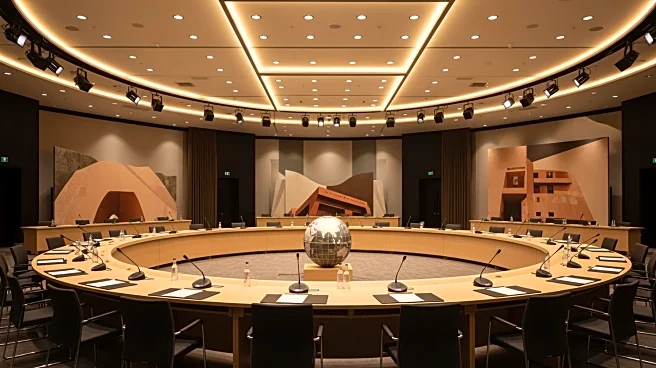What's Happening?
The first Group of 20 summit held in Africa has commenced with an ambitious agenda aimed at addressing long-standing issues affecting the world's poorest nations. The summit, taking place near Soweto township
in South Africa, seeks consensus on priorities such as aiding poor countries in recovering from climate-related disasters, reducing foreign debt burdens, transitioning to green energy, and harnessing critical mineral wealth. However, the summit is overshadowed by the absence of the United States, following President Trump's order for a U.S. boycott due to claims of South Africa's alleged racist policies against its Afrikaner white minority. Despite the diplomatic rift, leaders like French President Emmanuel Macron emphasize the importance of engagement and collaboration to tackle global challenges.
Why It's Important?
The absence of the United States, the world's largest economy, at the G20 summit in Africa highlights significant diplomatic tensions and could impact the effectiveness of the summit's agenda. The G20, representing 85% of the global economy and 75% of international trade, plays a crucial role in bridging rich and poor nations to address global financial crises. The boycott by President Trump may undermine efforts to prioritize climate change and inequality, issues that are central to the summit's discussions. The situation underscores the challenges of achieving consensus among diverse member interests, including those of major economies like the U.S., Russia, China, and the European Union.
What's Next?
The direction of the G20 bloc is likely to shift as the United States assumes the rotating presidency from South Africa at the end of the summit. The Trump administration's stance against focusing on climate change and inequality may influence future agendas. South African President Cyril Ramaphosa has vowed to issue a declaration from all present members, despite U.S. pressure to tone down the final document. The formal handover ceremony will see a U.S. Embassy representative in South Africa accept the G20 presidency, a move considered an insult by South Africa.
Beyond the Headlines
The diplomatic rift between the U.S. and South Africa highlights broader geopolitical tensions and the complexities of international cooperation. The G20's reliance on consensus rather than binding resolutions often complicates efforts to address global issues effectively. The summit's focus on climate change and inequality reflects growing concerns about global disparities and environmental challenges, which require collaborative solutions. The evolving dynamics within the G20 may influence future international policies and the role of major economies in addressing global crises.










